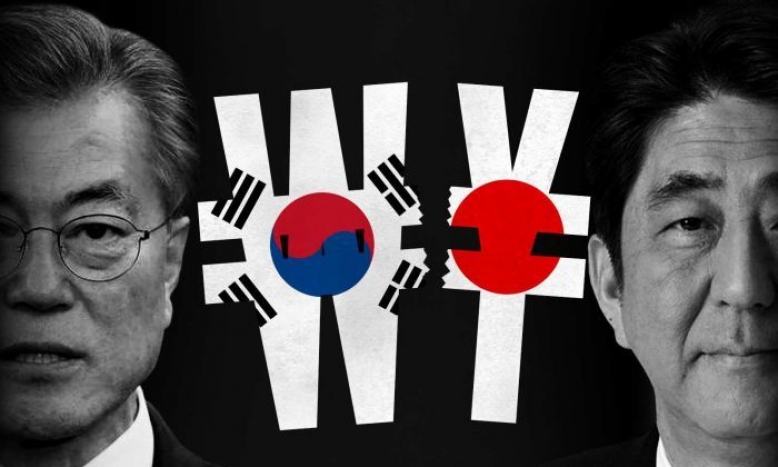 President of S. Korea, Moon Jae-in, and the Prime Minister of Japan, Shinzo Abe, are requested to hold a summit to reconcile both countries amid the wartime incidents during Japan's invasion over the Korean Peninsula in WWII era. (Image via ABC)
President of S. Korea, Moon Jae-in, and the Prime Minister of Japan, Shinzo Abe, are requested to hold a summit to reconcile both countries amid the wartime incidents during Japan's invasion over the Korean Peninsula in WWII era. (Image via ABC)
Japanese and S. Korean lawmakers call for détente
On Friday, Japanese and South Korean (S. Korea) lawmakers, both agreed that both countries need to hold a summit to mend their bilateral relations, a call for the Prime Minister of Japan, Shinzo Abe, and President of S. Korea, Moon Jae-in.Meeting with the S. Korean parliamentarians at the Diet building, Tokyo, cross-party groups of two countries consisting of Japanese lawmakers, headed by Fukushiro Nukaga, and his S. Korean lawmakers, headed by Kang Chang Il, both agreed that they gathered together to promote cooperation, not conflict.
Nukaga pointed out that correct choices have to be made for top-down resolutions between the two conflicting countries. Kang also supported Nukaga’s statement, adding that the tension spread to economic and security sectors. The S. Korean lawmaker agreed that the dialogue must continue to break the stalemate.
In a joint statement, the lawmakers of both countries agreed to form a special committee for dialogue ahead of the 2020 Summer Olympics and Paralympics in Japan.
The meeting came a week after the Prime Minister of S. Korea, Lee Nak-yeon, visited Japan to attend the enthronement ceremony of Emperor Naruhito. Meeting with his Japanese counterpart, Abe and Lee both displayed their wills to repair the bilateral ties between the two countries. During the 20-minute meeting, Lee also delivered a letter to Abe from Moon that emphasized the fact that Japan is an important partner for S. Korea in the economic and security sectors.
Japan and S. Korea saw their bilateral relations deteriorated to its lowest point in years after bringing up the wartime incidents during Japan’s invasion over the Korean Peninsula in 1910 – 1945. In 2018, the Supreme Court of S. Korea demanded the Japanese companies to compensate for wartime labor which Japan claimed had been settled in the 1965 agreement at US$500 million to Seoul.
The relations dived deeper when both countries erased both names from each other’s “whitelist”. Japan imposed export curb for important chemicals on S. Korea.
In retaliation, S. Korea stated in August that it would not extend the General Security of Military Information Agreement (GSOMIA), a Japan – S. Korea military agreement pact that helps Japan to counter any projectile from North Korea (N. Korea). GSOMIA is going to expire by the end of November.
Source: https://bit.ly/2C7cZcB
 English
English Japan
Japan

generic prednisone prednisone 0.5 mg does prednisone make you sleepy what is prednisone tablets used for
ivermectin pronunciation ivermectin 15 mg ivermectin dosage for human demodex if you dose ivermectin to your chickens, how long before you can eat the eggs?
belviq reviews aquaphor samples for healthcare professionals viagra on line diazepam and grapefruit side effects discount vegetable seeds free shipping
zithromax anxiety zithromax medicine azithromycin over the counter for chlamydia how to get azithromycin online
free professional samples for pediatricians combining levitra and viagra cheap viagra prescription cialis best timing effectiveness medication price list every day cialis viagra cheap online cialis best price tadalafil new prescription printable coupon marley drug consumer complaints how to take viagra for best results order prescription viagra online what is female viagra check my order trust pharmacy compare cialis vs viagra viagra gold 800 mg bestellen cheap online viagra walmart lawsuit settlement checks cialis for daily use cost online viagra cheap low women's libido buy pain meds online overnight walmart prescriptions price check order viagra pills online brand name viagra no generic curing erectile dysfunction diabetes chinese male enhancement pills viagras buy vigora in canada viagra pfizer patient assistance program viagra use $25 cvs prescription transfer coupon
dapoxetine reviews priligy online singapore hoe can i buy priligy in usa how long for dapoxetine to work
priligy efectos secundarios how much longer is sex with dapoxetine how to get priligy in usa
corona virus plaquenil plaquenil eye exam optometrist or ophthalmologist why is plaquenil taken with milk
enterococcus coverage amoxil purchase amoxil 250mg amoxicillin amoxil 500 mg uses nausea amoxicillin
zithromax suspension dosing is azithromycin the same as zithromax how much does azithromycin cost at walmart
prednisone belly prednisone uk over the counter can prednisone cause a rash how long do prednisone side effects last
buy ventolin can i buy ventolin over the counter is ventolin the same as albuterol how to get precription ventolin
tadalafil 10 mg dosage buy generic drugs from india viagra tablets viagra super force reviews viagra compared to cialis dosage viagra jelly review
alcohol amoxicillin purchase amoxil 500mg can i take amoxil while breastfeeding alternatives to amoxicillin
best supplements on the market mail order pharmacies best fitness supplements for women sildenafil viagra viagra over the internet tadalafil 20 mg top generic viagra sites
ivermectin guinea pig cheap stromectol how to buy ivermectin for humans how much ivermectin injectible to give a baby raccoon
lasix online furosemide rx 20 mg renal scan with lasix cpt code what is furosemide medication used for
ventolin generic albuterol 0.5 over the counter side effects of ventolin in toddlers where to buy ventolin inhalers online
modafinil buy australia modafinil 200 modafinil how long to kick in how long does 200mg of provigil stay in your system
albuterol and pneumonia ventolin 4 mg tablets ventolin syrup for dry cough how is albuterol made
how to take viagra effectively prescription weight loss pills best price for viagra 100mg walmart viagra sildenafil webmd gold max supplement sidenal